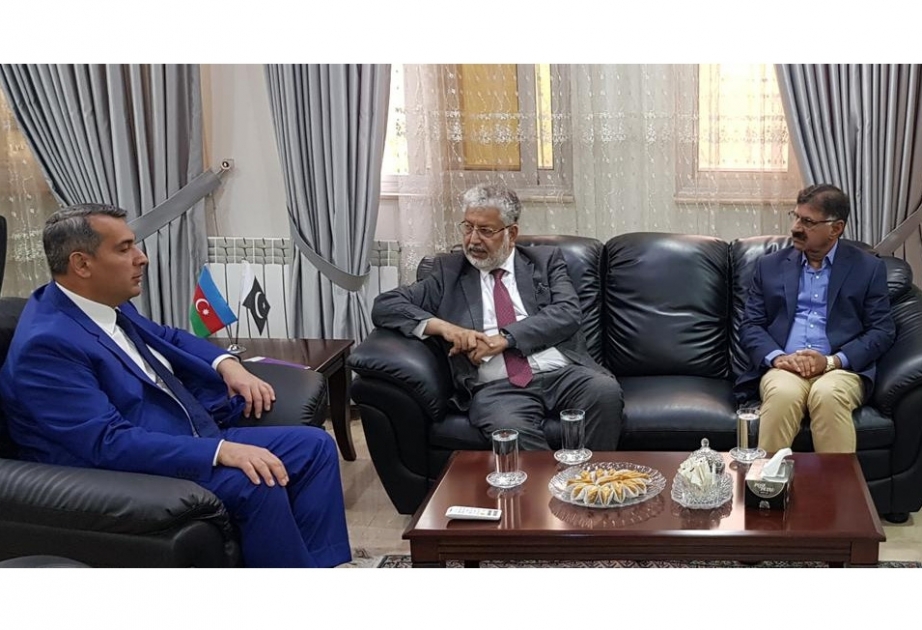SCIENCE AND EDUCATION
Digital transformation in education

Baku, May 16, AZERTAC
Rector of ADA University Hafiz Pashayev has written an article headlined “Digital transformation in education”.
AZERTAC presents the full text of the article.
“In academia as in many other sectors of society, digitalization has been a priority for leaders and managers for a number of years; but the reality is that too few organizations, companies, and universities have been able to successfully implement the much-vaunted digital transformation in their respective environments.
A number of explanations have been offered. Some have limited themselves to talking about this new buzzword or made what amount to cosmetic adjustments or changes. Others have made genuine attempts, but ultimately failed due to a combination of external and internal factors.
ADA University is proud to have been at the forefront of Azerbaijan’s digital transformation in the education sector. The strategic advantage of having taken all necessary steps as soon as it became feasible has been demonstrated during the onset of the COVID-19 pandemic. Indeed, the university’s digital makeover has served as the basis of our capacity to continue to provide top-notch education services during this pandemic. In this article I would like to share some thoughts and reflections on our achievements, ongoing challenges and plans for the future.
Back in 2006
When the Azerbaijan Diplomatic Academy (the precursor to ADA University) was founded in 2006, our initial vision already included moving beyond the professional training of diplomats. In other words, right from the start we intended to set up a full-scale university to prepare the next generation of leaders in a number of fields necessary for Azerbaijan to accelerate its rapid growth and modernization effort—diplomats included, of course.
So, we built from the ground up, constructing a modern campus with labs, library and IT facilities as well as student centers and classrooms. Creating a state-of-the art campus in the heart of our capital city required a new type of thinking as much as a new approach in terms of design and education planning.
From very early on we realized that the creation of a new and modern campus would result not only in a high level of comfort for students; it would also help us attract the best available teacher talent to ADA. We drew inspiration from some of the world’s best universities, both in the West and the East, drawing lessons from their experience and learning from their best practices.
We also invited architects from the United States to develop both the university’s physical infrastructure and educational concept. The campus was planned and built on the basis of “green” principles. For example, we utilized as many energy efficient materials as possible in our construction and installed a renewable energy power-generating facility. We also helped pioneer the concept of a “smart” campus in this part of the world: from the start, we placed heavy emphasis on IT technologies, including the provision of free wi-fi and email accounts to the entire ADA community as well as purchasing various types of software to run our library, the admission process, and our academic units. Finally, we instituted technological tools to foster a transparent exams and assessment process.
Human potential
Building a modern and beautiful campus is, by itself, not sufficient to ensure the success of any university. In parallel to our construction project, therefore, we launched a recruitment drive to attract the best professors from both Azerbaijan and abroad, offering them competitive salaries and other benefits.
At the same time, we also assigned them strict and clear responsibilities. Most of them were required to possess a doctoral degree from a reputable university abroad, speak fluent English, teach in an interactive way, be willing to learn and grow professionally, publish extensively, and engage in teamwork. Emphasis was placed on ensuring their IT skills were up to date. Moreover, both faculty and staff were recruited in a transparent and meritocratic manner. The extraordinary talent pool we put together helped us establish the right values, team culture and ethical standards from the very beginning.
And it is precisely thanks to this experienced and flexible team of brilliant and dedicated faculty and staff that we were able to continue transforming our university.
Digital Transformation
We all know how much of our daily lives—the way we think about work, conduct ourselves professionally and handle many of our daily tasks—has been transformed by technological progress and innovation. Machines and automatization create not only enormous pool of data and opportunities for thinking, analyzing and making informed decisions in novel ways; with proper use, they also change our values and ethics for the better. At ADA University, we began the digitalization process with our essential departments: admissions, the library, academic units, and career services. The spirit of innovation was always with us because we embraced the idea that innovation is a never-ending process.
For instance, every prospective ADA University needed to apply online through our Embark program. The collected data was both plentiful and useful in analyzing trends, creating statistical reports and making urgent interventions. Data was also used for marketing and communication purposes. Through these and other ways applicants became permanent stakeholders in the success of the university—even if they were not admitted in a particular year.
Data was later utilized to create more detailed student records, drive class registration, process the issuance of transcripts, and so on. Managing the academic life of the university—including exams, schedules, faculty and student activities—was made possible thanks to software called PowerCampus that we purchased in 2008. Weekly reports were available with regards to grades, attendance, exam schedules, and class duration. Deans, Vice Rectors and even the Rector was able to log in into the system and see all exam results in real-time, which ensured the transparency of the exam process.
Similarly, the ADA library purchased the Millennium software package to manage the collection of books and databases, the registration of students and the distribution of books and journals. In 2019, the ADA Library implemented a more functional cloud-based library system: WorldShare Management Services. We were the first and remain the only institution in Azerbaijan to institute a fully integrated library system, which brings together seamlessly all subscription databases, book catalogues, and similar operations. The WMS system provides centralized electronic information management and distribution options for ADA Community, ensuring unhindered access to electronic libraries, databases and digital repositories around the world. After its implementation ADA Library’s slogan became: save your time, easily access from anywhere and make use of reliable academic resources.
Around the same time, ADA’s Career Services purchased the highly-rated Simplicity program to post news about jobs and vacancies as well as manage the professional and career development of students whilst linking them with various companies and industries.
All of these programs have made our academic management easy, transparent and available for statistical and business analysis, reports, discussions and better decision-making. Students were also quickly adapting to the use of these programs, thus improving their IT skills and preparing to participate more fully in contemporary society.
It was not long after the software purchases by our library and Career Services that we came to realize the importance of automatization for other units of the university as well. We thus purchased SAP package to manage our finances, human resources, procurement, asset management, facility management, and other related units and functions. ADA University was one of the first institutions in Azerbaijan to use SAP, while many reputable companies were still using less advanced programs, like 1C for financial accounting.
Bringing all under one umbrella
While these new software programs were very useful and functional, they were not integrated. Each ADA unit has purchased a program that was best suited to its respective core functions and needs. Yet cross-system data-sharing and integration proved to be impossible. We needed a single overarching platform to integrate all our units and departments. In fall 2015, ADA University conducted a comprehensive strategic planning exercise. The university’s senior leadership recognized that maintaining disparate systems not only resulted in insufficient data for reporting and analytical purposes, but sub-optimally served faculty, staff and students.
To that end, in late 2015 we purchased and began to implement Banner (a student information system), Banner Enterprise Resources Planning (ERP) and Blackboard (a learning management system): these programs that helped us get rid of duplication and redundancy whilst bringing all data under same umbrella. ADA’s leadership established an ambitious “go-live” goal of ten months for Banner SIS, following the introductory presentations by a senior Banner consultant.
Each program is especially designed for academic institutions and we use them not only for ADA University but also for ADA School, our university preparatory educational institution. Banner and Blackboard are flexible and can be tailor-made to the specific needs and requirements of clients. Both have helped us to transform not only the university’s management and its academic processes, but have also transformed our teaching methods and processes. The teaching process has been greatly strengthened by having the ability to post materials online, create online discussions, forums, developing tests and other online assessments, and requiring students to submit homework electronically and fully respect set deadlines.
In no small measure due to these two programs, our teachers have efficiently combined in-class interactive teaching with smart boards, audio-video materials and other ICT tools with the resources of the Blackboard program to enrich the learning process. Students were able to see their exams, grades, tuition payments, homework, and other materials in one unified platform. Both programs are tied to local and secure, remote cloud servers to store data. ADA University has invested significant funds to train teachers in the use of Blackboard, including training sessions conducted in Manchester, UK and Dubai, UAE.
Moreover, the Banner program helps us not only with data and reports, it has also enabled us to streamline and improve our business processes and procedures, eradicate duplication, and enhance efficiency and transparency. Advance planning and teamwork have become important foundations for ADA University’s daily operations.
Over a twelve-month period, ADA Finance, Budget, Assets and Procurement, Human Resources, and Facilities management teams worked intensely on the deployment of the new Banner ERP system, resulting in a successful launch in January 2019. More than 30 staff members participated in the development of a new organizational chart; departments, units and cost centers; faculty and staff positions, employee and position classifications, grades and levels, compensation, and benefits packages; budgets and budget processes; purchasing requests and orders; assets classification, audit and management; hierarchy and reporting system; new facilities management procedures; and much more.
Our 30 or so core Banner specialists become so proficient in using the software that they were able to train the rest of the university’s staff. We have made plans to offer their training expertise as a service to other universities in Azerbaijan and the region. We have already been approached by Kazakhstan’s Nazarbayev University to share our experience.
For the successful and very rapid implementation of Banner program, ADA University became the first university in the region to receive prestigious annual Banner award.
Lessons learned
Digital transformations and the introduction of new software come with both opportunities and risks. Many companies, institutions and organizations fail to successfully implement them and use them optimally. Several important factors determine they succeed or fail. Foremost, of course, is the vision of the leadership, which must clearly understand the benefits of such programs and properly incentive their workforce to accept and embrace automatization and digital transformation. Such steps invariably change the spirit and culture of a given organization. When done right, these can make people optimistic about the future of their workplace, bring them together as a unified team, organize them efficiently, and rally them around a specific mission and goals. Employees will take on a sense of responsibility, accountability and devotion to the new strategic vision they played integral roles in tailoring, implementing and ultimately using.
Managing change is not easy. Some resist, of course: either because they don’t want to lose their comfort zone or because they will not understand the benefits of the change. A few might even try to sabotage the process. Preventing resistance requires putting the right people in charge of the change-management process and empowering them to get the job done. It is also important to solicit and receive regular feedback, reports, implementation updates, as well as to gather larger teams to discuss and brainstorm. If done right, some of the loudest initial critics of new technologies and technological progress end up becoming the strongest advocates of the new tools and systems. It is also important to choose the right outside consultants and implement mandated changes along strictly set deadlines and well-defined milestones.
The training of team members, faculty and staff is also important. It is vital to invest in the managers of the process, end-users, and other stakeholders to ensure they better understand the details and optimally use the programs. We found that the opportunity for staff to work together in teams in planning data entry into the Banner system and to participate in configuring the system specifically to ADA requirements was an enlightening experience.
It is also important to constantly invest in IT resources. Upgrading programs, servers, hardware can be difficult process, because of its financial costs and quick shifts in the technological markets. It requires teamwork to plan and budget for these costs, predict upcoming technological changes and prepare for the arrival of new products into the market.
Implications for coping with COVID-19
We began to instill technological change one decade ago. At the time, no one imagined that a pandemic world would change the world so much and in such a way as it has. Today, many organizations feel paralyzed because of COVID-19 and many institutions have rushed to install new programs to manage their entities and to communicate with stakeholders.
Universities are no exception, and many of them have felt handicapped because of an absence of online teaching tools. Others made hasty choices to use free tools, paying scant attention to cyber-security issues or whether these were fit for academic purpose.
ADA University was well prepared for the onset of the pandemic: within two weeks we were able to ensure all our classes were being taught online. Every single faculty member was already familiar with Blackboard and was able to utilize its Collaborate component to fully and effectively teach online. Students were also familiar with the details of this program, which they have been using since 2017. The university’s leadership was quick to bring together all of ADA’s deans and faculty to familiarize them with new rules, policies and procedures of online education. Weekly discussions and coordination meetings were held to ensure the quality of the teaching remained high, seek advice, give feedback and address the concerns.
Obviously, online education has its shortcomings too. Students and faculty experience internet connection disruptions on occasion, although the country’s internet providers took measures quickly to improve the reliability of their respective network. To fully ensure the validity of online exams, we decided to purchase a specialized software called Respondus. What remains to be both discussed and determined is whether online teaching results in the same qualitative level of learning as in-person education. We do know that other components of traditional education, such as peer-to-peer learning and cultural upbringing, are also missing in the online education experience. We remain optimistic, however, that improvements will be made and online teaching methods will become more sophisticated as universities around the world share their best practices in the time ahead.
The central takeaway from our experience is that we should not be afraid of change, innovation, technological and digital transformation. All this has already become an integral part of our everyday reality. We should get in front of change and manage it so that organizations stand the best chance of benefiting from it, creating new opportunities for stakeholders. No one knows exactly how and when this pandemic will end, but we should err on the side of caution by expecting and planning for unforeseen challenges in the future as well. In other words, we should be ready for new risks and as well as new opportunities when it comes to technological tools.
For us at ADA University, an important task for the near future is to make better use of big data and position ourselves to be able to make increasingly more informed decisions based on statistical and business analyses. For that purpose we have already purchased Argos software. We also plan to expand online teaching to cover certificate programs and professional development training. Online education at ADA University has become a reality and this reality is yet another new page in our history.
We are proud of the fact that while we were preparing to establish a modern campus and comfortable classrooms, we were also thinking about digital resources and digital transformation. In that respect, we feel we have more than met the expectations of parents and students whilst ensuring that the Spring 2020 semester was able to go on without interruption, notwithstanding the measures taken to contain and overcome the pandemic. Indeed, the parents that have had an opportunity to observe their children’s online classes have expressed great satisfaction with the results.
In short, whereas in the past online teaching was done to compliment traditional teaching, nowadays the learning and teaching process will have to be mix of both methods.”








